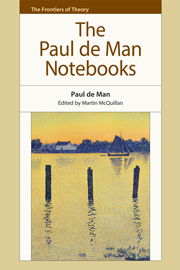Book contents
- Frontmatter
- Contents
- Series Editor's Preface
- Acknowledgements
- Dedication
- Introduction: ‘The Unimaginable Touch of Time’: The Public and Private in the Notebooks of Paul de Man
- PART I Texts
- 1 The Drawings of Paul Valéry (1948)
- 2 Jacques Villon (1952)
- 3 Graduate Essay on Keats (1954)
- 4 Postdoctoral Essay on Symbolism (c. 1960)
- 5 Introduction to Madame Bovary (1965)
- 6 Introduction to The Portable Rousseau (1973)
- 7 On Reading Rousseau (1977)
- 8 Translator's Introduction to “Rousseau and English Romanticism” (1978)
- 9 Rousseau and English Romanticism (1978)
- 10 Introduction to Studies in Romanticism (1979)
- 11 Hommage à Georges Poulet (1982)
- 12 A Letter from Paul de Man (1982)
- 13 Reply to Raymond Geuss (1983)
- 14 Interview with Robert Moynihan (1984)
- PART II Translations
- PART III Teaching
- PART IV Research
- Appendix. The Notebooks of Paul de Man 1963–83
- Bibliography
- Index of Names
4 - Postdoctoral Essay on Symbolism (c. 1960)
from PART I - Texts
Published online by Cambridge University Press: 05 December 2014
- Frontmatter
- Contents
- Series Editor's Preface
- Acknowledgements
- Dedication
- Introduction: ‘The Unimaginable Touch of Time’: The Public and Private in the Notebooks of Paul de Man
- PART I Texts
- 1 The Drawings of Paul Valéry (1948)
- 2 Jacques Villon (1952)
- 3 Graduate Essay on Keats (1954)
- 4 Postdoctoral Essay on Symbolism (c. 1960)
- 5 Introduction to Madame Bovary (1965)
- 6 Introduction to The Portable Rousseau (1973)
- 7 On Reading Rousseau (1977)
- 8 Translator's Introduction to “Rousseau and English Romanticism” (1978)
- 9 Rousseau and English Romanticism (1978)
- 10 Introduction to Studies in Romanticism (1979)
- 11 Hommage à Georges Poulet (1982)
- 12 A Letter from Paul de Man (1982)
- 13 Reply to Raymond Geuss (1983)
- 14 Interview with Robert Moynihan (1984)
- PART II Translations
- PART III Teaching
- PART IV Research
- Appendix. The Notebooks of Paul de Man 1963–83
- Bibliography
- Index of Names
Summary
All has been said, it seems, about symbolism. No period of literature has been explored more thoroughly; none to which the techniques of contemporary historical and critical research have been more conscientiously applied. The conditions for this exploration were highly favorable. We have all the texts at our disposal, not only in their final version, but in preliminary stages and with variations as well. The biographies of the main figures – Baudelaire, Rimbaud, Mallarmé – are known in all details; there is hardly a letter ever written by them that has not been recorded. The complete editions stand as examples of scrupulous editorship. Mondor's day by day biography of Mallarmé remains a miracle of precision, in which the least eventful of all lives reveals its hidden depths and complexities, like a drop of water under a microscope. Even Rimbaud's mysterious Abyssinian adventure is accessible to the reader of his correspondence. As for the surroundings among which this poetry originated, they are close enough to us to be directly perceived. The Paris of today still contains the Paris of Baudelaire; Rimbaud's Charleville is an all too familiar picture for those who know the north of France and the secluded warmth of the apartment of the Rue de Rome could be a remembrance of our grandparents' homes. Ideological and historical trends of the period can be imagined, not like the abstract and fantastic picture which the medieval world will always have to remain for us, but in their actual, concrete presence.
- Type
- Chapter
- Information
- The Paul de Man Notebooks , pp. 48 - 61Publisher: Edinburgh University PressPrint publication year: 2014



